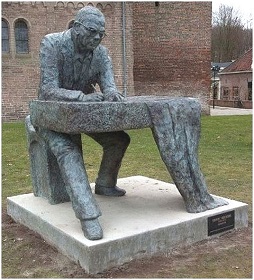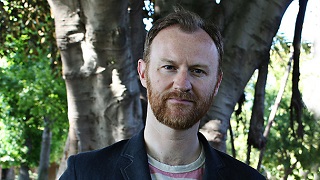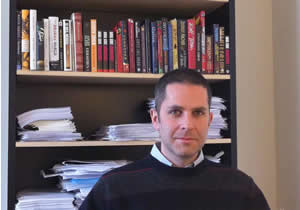De Nederlandse schrijver Simon Vestdijk werd geboren in Harlingen op 17 oktober 1898. Zie ook mijn blog van 17 oktober 2010 en eveneens alle tags voor Simon Vestdijk op dit blog.
Uit: Meneer Visser’s hellevaart
“De gedaante in de hoek, waarmee Visser zich vreemd verbonden voelde, verrees langzaam en strompelde naar het rechterraam, één arm achteruit, alsof ze zich op de lucht steunen wilde. Links, op de vensterbank, zat de jongen met zijn handen aan de spijlen naar buiten te kijken. ‘Vader, daar loopt een hondje tussen die meneer z’n benen,’ – maar niemand antwoordde. Was hij het soms, Willem Visser, die iemand in de weg liep? Was hij naakt? Had hij iets gebroken, iets verzet? Het kon ook de gedaante in de hoek zijn, voor het raam zijn – pas op, straks valt ze eruit!! – die dat gedaan had. Ze was zo mager, dat men gedurig vlak naast haar keek; met het glas rammelde ze mee, en nu zat ze er ineens helemaal binnenin, zodat men wel door haar heenkijken moest. Ze was ouder dan de apotheek aan de overkant, – maar jonger dan de wolken. ‘Oom, ik ben uw broer, en moeder geeft vader de hik aan jou…’ Boem, boem, tsjing! De muziek, die nu óók in het glas zat, vormde allerlei trillingsfiguren van het fijn glippende zand, dat over het venster heen schoot en het geheel bedekken ging: duizend sterren!… Visser wilde vluchten uit deze wereld die hem benauwde, hij sloeg zijn arm om de gedaante heen, stond op een strand, reed op een dwars over het Schoolplein gespannen touw, – hoorde touwtrekken dan bij een optocht als deze? – voelde onder zich, achter zich, voor zich alweer de gedaante, die, in een te ruim schort meeschommelde, – en ontwaakte plotseling, in een steile zwaai naar het licht toe, met een gevaarlijk schokkend gevoel in zijn onderlijf, terwijl in zijn kaak die eigenaardige trekking zat, die hij kende van nóg vroeger: sluipend, weerbarstig, onontkoombaar, alsof met traag geweld de tanden naar buiten werden gebogen. Hij wist niet op welke van de twee gewaarwordingen hij het meest letten moest. Zijn voorhoofd was klam. Angst even… Onder de dekens kruipen?… Maar reeds toonde de kamer hem het rustig gebloemd behang, waar hij zo vaak overheen was gereisd, ’s ochtends, of op zomeravonden. Alles werd vertrouwd. Hij herkende zichzelf. Zijn ademhaling welbewust overnemend van het gedienstige lijf, vergewiste hij zich met voldoening, dat er niets gebeurd was. Niet eens nodig m’n hand uit te steken, een kramp, niets van betekenis… Ellendig scheurend gevoel altijd. Pijnlijk. Beter bij me houden. Vijf weken al… Verduiveld, nu klopt ’t hart ook weer anders, dat wou ik juist aan Touraine… Eén, twéé, en dan een dof bonzend sprongetje… Toktokbóém… Zou ’t dan tóch niet in orde zijn?… Aambeien niet erg pijnlijk nu, niet zwaar… Droom?…”

Simon Vestdijk (17 oktober 1898 – 23 maart 1971)
Standbeeld in Doorn, ontworpen door Jaap te Kiefte


